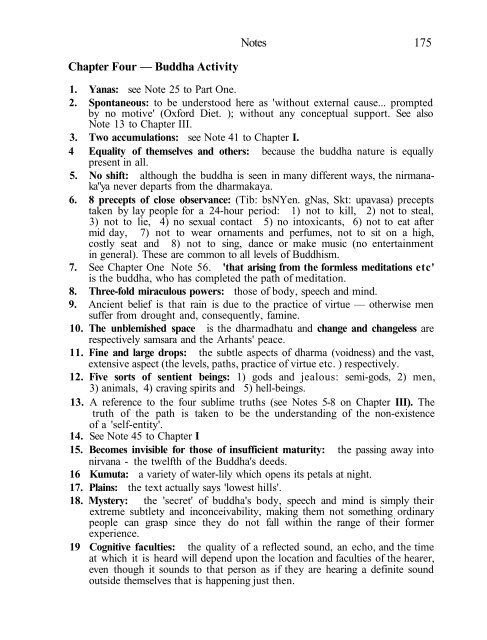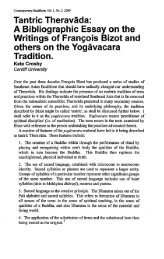The Changeless Nature
The Changeless Nature
The Changeless Nature
- No tags were found...
Create successful ePaper yourself
Turn your PDF publications into a flip-book with our unique Google optimized e-Paper software.
Notes 175Chapter Four — Buddha Activity1. Yanas: see Note 25 to Part One.2. Spontaneous: to be understood here as 'without external cause... promptedby no motive' (Oxford Diet. ); without any conceptual support. See alsoNote 13 to Chapter III.3. Two accumulations: see Note 41 to Chapter I.4 Equality of themselves and others:present in all.because the buddha nature is equally5. No shift: although the buddha is seen in many different ways, the nirmanaka"yanever departs from the dharmakaya.6. 8 precepts of close observance: (Tib: bsNYen. gNas, Skt: upavasa) preceptstaken by lay people for a 24-hour period: 1) not to kill, 2) not to steal,3) not to lie, 4) no sexual contact 5) no intoxicants, 6) not to eat aftermid day, 7) not to wear ornaments and perfumes, not to sit on a high,costly seat and 8) not to sing, dance or make music (no entertainmentin general). <strong>The</strong>se are common to all levels of Buddhism.7. See Chapter One Note 56. 'that arising from the formless meditations etc'is the buddha, who has completed the path of meditation.8. Three-fold miraculous powers: those of body, speech and mind.9. Ancient belief is that rain is due to the practice of virtue — otherwise mensuffer from drought and, consequently, famine.10. <strong>The</strong> unblemished space is the dharmadhatu and change and changeless arerespectively samsara and the Arhants' peace.11. Fine and large drops: the subtle aspects of dharma (voidness) and the vast,extensive aspect (the levels, paths, practice of virtue etc. ) respectively.12. Five sorts of sentient beings: 1) gods and jealous: semi-gods, 2) men,3) animals, 4) craving spirits and 5) hell-beings.13. A reference to the four sublime truths (see Notes 5-8 on Chapter III). <strong>The</strong>truth of the path is taken to be the understanding of the non-existenceof a 'self-entity'.14. See Note 45 to Chapter I15. Becomes invisible for those of insufficient maturity: the passing away intonirvana - the twelfth of the Buddha's deeds.16 Kumuta: a variety of water-lily which opens its petals at night.17. Plains: the text actually says 'lowest hills'.18. Mystery: the 'secret' of buddha's body, speech and mind is simply theirextreme subtlety and inconceivability, making them not something ordinarypeople can grasp since they do not fall within the range of their formerexperience.19 Cognitive faculties: the quality of a reflected sound, an echo, and the timeat which it is heard will depend upon the location and faculties of the hearer,even though it sounds to that person as if they are hearing a definite soundoutside themselves that is happening just then.
















